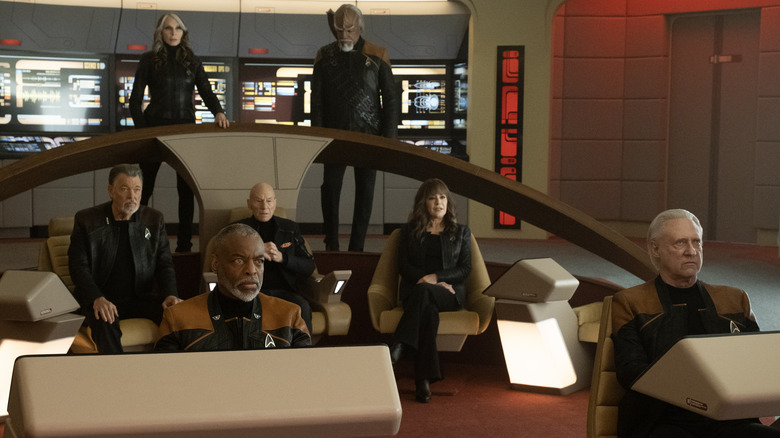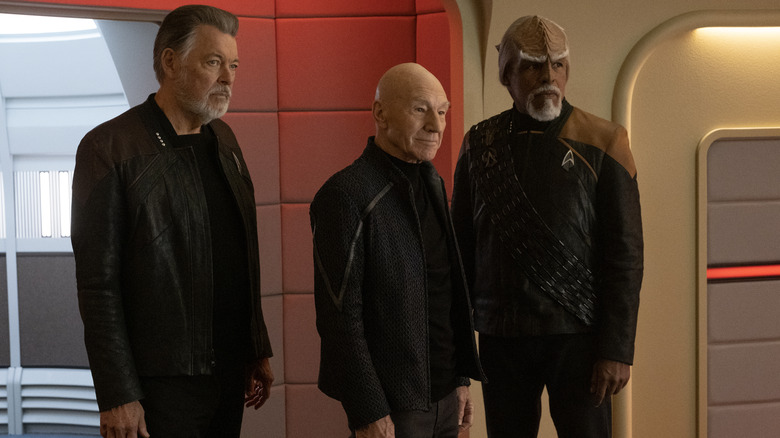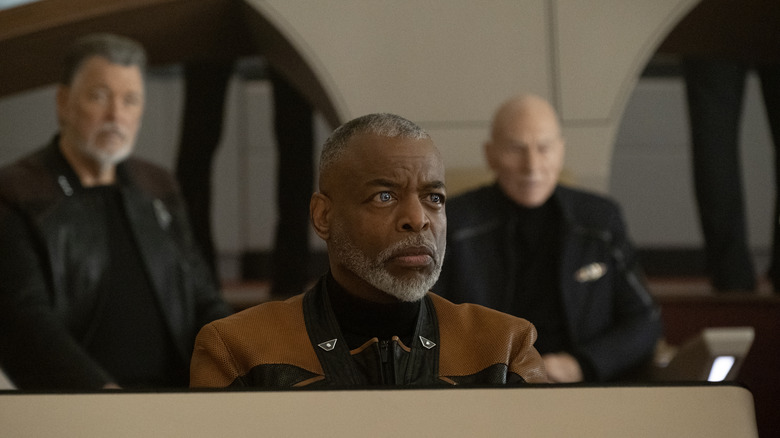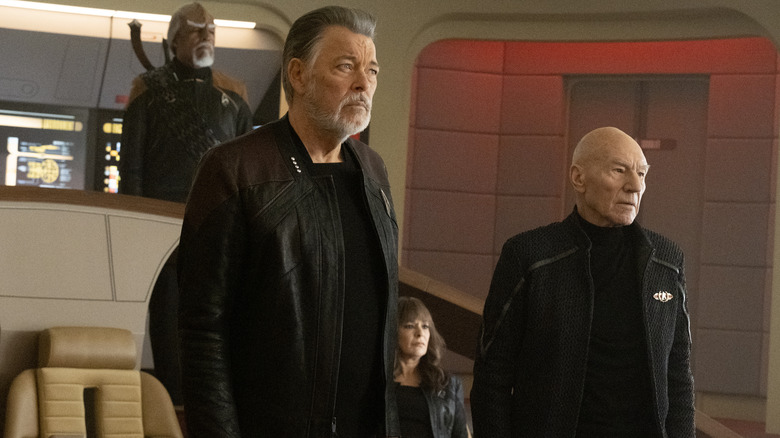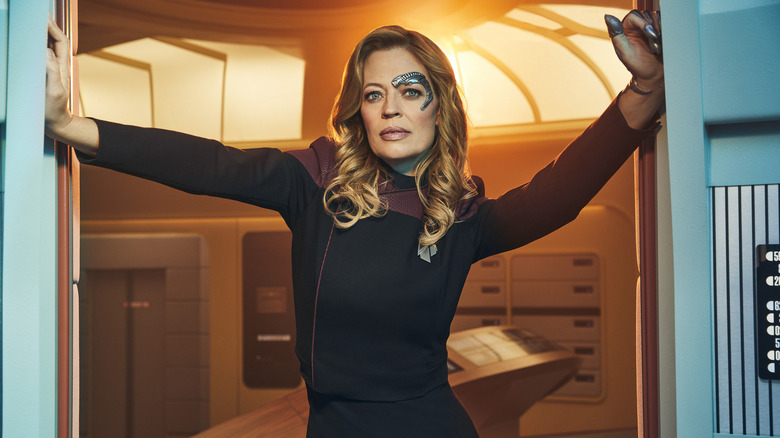Star Trek: Picard Season 3 Episode 10 Review: The Sky's The Limit In The Series Finale
When the third season of "Star Trek: Picard" began, this old Trekkie declared it to be the best "Star Trek: The Next Generation" movie we never got. This was a bit of a dubious comparison, as the four extant "Next Generation" movies never quite reached the intellectual highs of the TV series on which they were based. "Star Trek: Generations" was weirdly preoccupied with "passing the torch" moments, bending over backward to get Jean-Luc Picard (Patrick Stewart) and James T. Kirk (William Shatner) on screen together. "First Contact" was an enjoyable enough action picture, but it dumbed down a lot of the show's more interesting notions about the Borg, and, in being a full-scale action picture, only served to highlight how ill-suited the NextGen cast was for such a genre.
"Insurrection" more or less repeated the premise of the episode "Who Watches the Watchers" (October 16, 1989), but tried to stage it as an action/mystery story rather than an ethical dilemma, only with a paltry budget. And finally, "Nemesis" was such an unabashed "Wrath of Khan" retread that few embraced it; "Nemesis" remains the lowest-grossing Trek film of them all.
While each of the above films possesses its own appealing qualities, they all bear the same central error: they tried to present "Star Trek" as something more action-forward than it typically is on TV. The movies have much simpler plots, a lot more violence, and way too many dumb, action-movie one-liners. Trek is best when it's less action-heavy and more cerebral. The movies, in attempting to be "events," eschew that.
This season of "Picard," essentially being the fifth NextGen movie, also fell into the "action trap" to resolve its story, ending events with a daring rescue and a big explosion.
The epilogue, however, is where its heart lies.
Setting up the big fight
It won't be until the plot is resolved, and the survivors have a chance to sit and talk and merely be themselves outside the purview of the crisis at hand that "Picard" will reveal itself. The actual action climax of the season is quite silly, relying on an action sequence that closely resembles a notable moment from "Return of the Jedi."
At the end of the last episode, "Võx," Jack Crusher (Ed Speleers) had given his powerful psychic mind over to the evil Borg Queen (voice of Alice Krige), and had used their combined abilities to take over the minds of thousands of Starfleet officers. Meanwhile, Picard, Riker (Jonathan Frakes), Worf (Michael Dorn), Dr. Crusher (Gates McFadden), Geordi La Forge (LeVar Burton), Deanna Troi (Marina Sirtis), and the resurrected Data (Brent Spiner) sped off to the rescue in a reconstructed Enterprise-D. Many have seemingly responded very positively to the reappearance of the decades-old ship and the re-use of a well-worn "Star Trek" villain, while some of us rolled our eyes at the showrunner's reliance on blunt nostalgia imagery.
Some of that nostalgia continues into the show's final episode, "The Last Generation," which begins with a recreation of the "Next Generation" opening titles while a voice cameo from Walter Koenig plays in the background. Koenig — Pavel Chekov himself — plays a character named Anton Chekov, likely as a tribute to the late Anton Yelchin who played Chekov in the J.J. Abrams movies. Or perhaps as a reference to the playwright. He announces that the Federation is under attack.
The Enterprise-D can't enter the fray, but they can investigate the Borg ship in control of it all. As it so happens, it was hiding within the storms of Jupiter this whole time.
Return of the Jedi
The Borg ship in question seems to be on its last legs, and the Borg Queen has transformed herself into an H.R. Giger nightmare monster of piled-up mechanical guts. It's a pretty cool image. Jack, meanwhile, has been assimilated, complete with a robot suit and mechanical facial prostheses. In order to free Jack, Picard confronts him face-to-face and plugs a Borg wire into his neck, allowing them to have a psychic conversation. The "psychic conversation" now seems to be the commonest trope on "Picard," as it was previously done with Data, with Picard's late father, and between Data and Lore just a few episodes ago.
While Picard confesses his love for his son, the Enterprise flies through the guts of the Borg ship, firing weapons and seeking an explosive core. The sequence is straight out of "Return of the Jedi," turning the massive Enterprise-D into a quick-moving attack craft. For those who didn't study Enterprise schematics as teenagers, the saucer section of the ship is .29 miles across. The Borg ship was kind enough to construct ducts and passageways that can accommodate a Galaxy-class vessel.
That I was concerned about such nerdy details in the middle of the show's action climax perhaps speaks to how unengaging it is. The action is certainly competent, and the stakes are certainly high, also all the characters are appropriately panicked as they fight for their lives. But there is a distant, nagging sense of disappointment seeing "Star Trek" once again rely on a space battle and mere explosive spectacle to resolve its plot issues. As the action progresses, one can merely wait for it to end and for the heroes to emerge before they can begin connecting to the characters again.
Let's have a drink
After the Enterprise crew has rescued Jack and had a teary moment when it looked like all was lost, and after the U.S.S. Titan-A, commanded by Seven of Nine (Jeri Ryan) and Raffi (Michelle Hurd), tried to singlehandedly fight off a thousand attacking Starfleet vessels, the day is won.
The final scene of the series sees the NextGen cast gathered in Guinan's bar, enjoying cocktails and talking about nothing in particular. It's this final scene where "Picard" actually begins to shine. These are characters well-known to Trekkies, now decades older and with new lives, finally being allowed to converse and be themselves outside of a crisis situation. Their social dynamics click immediately back into place, and their friendships emerge. There is no longer any need to force sentimentality or nostalgia into the equation. Riker and Troi talk about taking a vacation. Data is going to therapy. Picard is, finally, finally, just allowed to be himself. Just like at the end of "All Good Things...," the final episode of NextGen, the characters end the day with a poker game. None of the show's previous stabs at manufactured wistfulness — such as when they ogled old starships in episode six — can match the naturalness of these scenes. It's a wonderful way to shut the book on the characters. We don't hold them up as heroes. They merely get to live.
As all the NextGen movies have proven, action will always be secondary to character, thought, and philosophy. "Picard" may have been low on philosophy, but this season was strikingly strong with character. It ended quite well. Quite well, indeed.
But, because of the nature of modern entertainment franchises, there had to be a spinoff tease. This was handled ... relatively well.
The tease
The spinoff tease: it's now been a year after Jack was a Borgy-Worgy bugle boy, and he was gleefully fast-tracked through Starfleet Academy, becoming an ensign right away. He acknowledges that he only got the gig because his parents were Dr. Crusher and Jean-Luc Picard. His first assignment will be back on board the U.S.S. Titan-A. For sentimental reasons, however, the Titan-A has been renamed the U.S.S. Enterprise-G. Seven of Nine is now the captain, following the death of Liam Shaw (Todd Stashwick) who, quite sadly, remained dead; there was no twist that could have brought back the show's standout new character. Quite the pity. Seven's first officer is Raffi, and the Enterprise-G will now go on its own merry adventures. One might say this twist was broadcasted earlier in the series when the Titan-A was reclassified as a Neo-Constitution-class vessel. Trekkies know that Kirk's Enterprise was a Constitution-class ship.
And, not to be outdone, there is a mid-credits tease wherein a certain, familiar, presumed-dead trickster god reappears to Jack and lets him know that he might be the lead in a new TV series. After the genuinely warm scenes of the NextGen cast talking and relaxing and drinking, the tease might feel a little mercenary on the part of the showrunners, a deliberate plea to make a new series called "Star Trek: Legacy."
Don't get me wrong. I would watch "Star Trek: Legacy" in a heartbeat, especially if the storytelling and pace and settings and characters were as strong as they have generally been in the third season of "Picard." But teasing a returning character and leaning heavily on nostalgia will not be what draws me to the show. After the last season of "Picard," perhaps Terry Matalas has worked the nostalgia out of his system. Perhaps now, he can go someplace new. Boldly go where no one has gone before.
